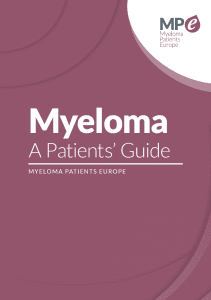Caring for yourself
For the doctors and nurses to provide the right treatment and ease any pain or discomfort you may be experiencing, you must tell them about any symptoms, even if they seem unimportant, like nausea or constipation. There are many ways in which they can help you be more comfortable, but this can’t happen if you keep these things to yourself. Don’t be afraid to share things that are bothering you, however small. Having a clear understanding of what you are experiencing will only help the medical professionals to get a full picture of the progress of your myeloma and how well your treatment is working.
Exercise will help to keep you fit, strengthen your muscles, and also promote a positive sense of well-being – that you are looking after yourself. Walking, swimming and aqua fitness are all good choices, as are exercise regimes such as yoga and Tai Chi. Gym training is also helpful, providing you have the approval of a physiotherapist or sports trainer before you start, and that you warm up and cool down carefully before and after exercising to avoid muscle strain.
The greatest challenge when taking exercise, if you have myeloma, is that your bones will be weakened. Strengthening your muscles will help to take the pressure off your bones, but exercise should be started very gently and gradually increased. If you have any pain, stop doing whatever caused it and only do what is comfortable. Contact sports, where you might easily knock into another person or sports equipment, should be avoided.
Plenty of rest and avoiding stress, if at all possible, will also help to keep you in good health.
It’s important to talk with your partner, so that you understand each other’s feelings and to make sure that neither of you misinterprets the situation. Once you start to talk, you should be able to find out what level of physical contact feels right for the time being, and then gradually develop that into fuller intimacy when you are ready. Your doctors and nurses can also offer guidance and support; and they will not be embarrassed if you ask for help.
Myeloma treatments, especially at high doses, can make you more likely to have mouth ulcers or an inflamed mouth lining. Some other treatments can temporarily lower your blood platelet count, and this can make you more liable to bleed from your gums. You may find that your mouth stays rather dry – this is because many myeloma treatments interfere with saliva production, and this can be relieved with an artificial saliva spray.
Pain in, or damage to, the jawbone (osteonecrosis of the jaw) is a very rare complication which may be linked to treatment with bisphosphonates and triggered by tooth removal. If you are about to begin bisphosphonate treatment, it is a good idea to have a dental check-up and any invasive dental treatment done first. Despite this very small risk, it is important for everyone with myeloma to be routinely treated with bisphosphonates to protect them from myeloma bone disease.
Active ageing is an idea that has been recognised by the world’s most influential organisations, including the World Health Organisation, the United Nations Economic Commission for Europe and the European Commission, and all these and more have developed guidance and recommendations. The basis of initiatives to support active ageing is helping people to remain physically and mentally active and independent, with a good quality of life for as long as possible and if possible, to contribute to the economy and to society. It is much more than a question of having a healthy diet and keeping up some form of exercise.
There will be times during your treatment for myeloma when you don’t feel well enough to be active, and then you must of course be guided by your doctor and nurses, and your own body. But myeloma is a relapsing-remitting disease, which means that you can expect to have long spells when the myeloma is stable and you can carry on virtually all of your normal activities, or even find new ones. There is now significant evidence that people who try to maintain social activities benefit from better health, a greater feeling of support from others and a stronger sense of wellbeing and self-esteem.
Apart from working, which is considered in the next chapter, you might find new enjoyment in many activities that are helpful to anyone in retirement, such as voluntary work, learning a new skill, or developing an existing interest in something you never previously had enough time for. An enormous number of life-long learning programmes are now available online for older people, many of which include local classes or visits. All of these will help you keep active, involved and interacting with like-minded people, and will use your knowledge and experience.
Subscribe to
our newsletter!


